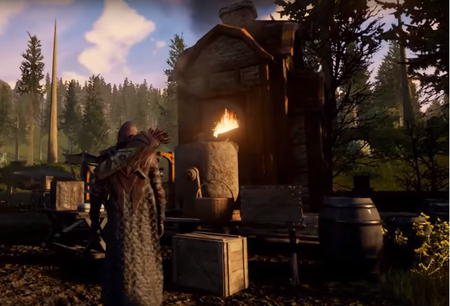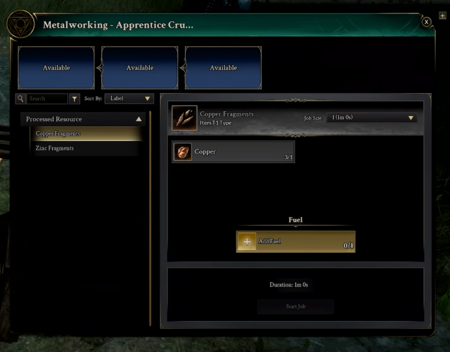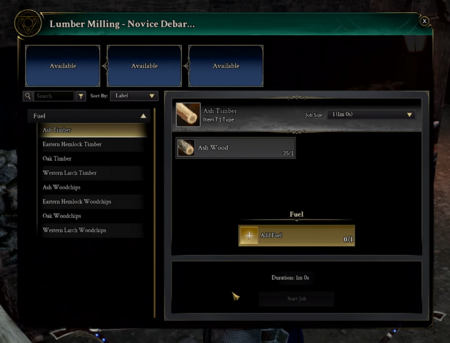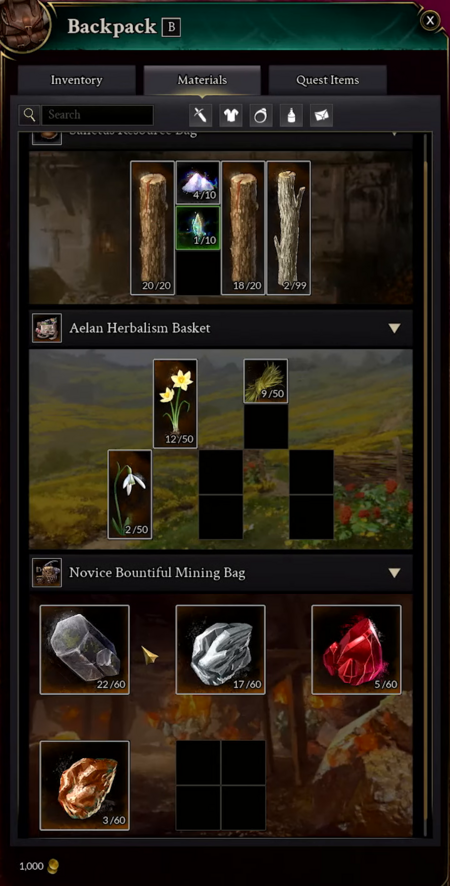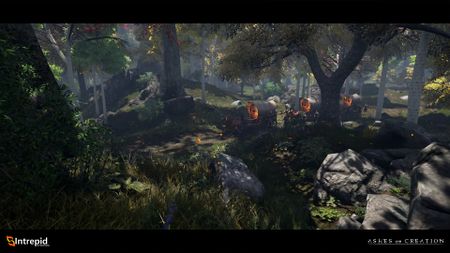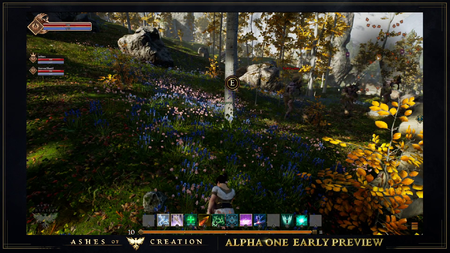Processamento
O processamento é uma das classes artesãs no Ashes of Creation.[1]
- O processamento envolve o refinamento de matérias-primas obtidas na coleta e pela desconstrução de itens.[1]
O processamento requere blueprints para a construção de edificações que são necessárias para processar recursos.[2]
- Edificações podem colocadas em um alódio para processar recursos.[1]
Processing professions
Processing stations
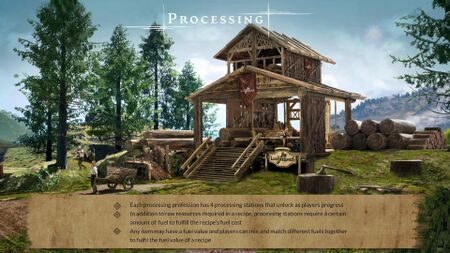
Processing stations are of course a necessary component of taking gatherables into usable crafted goods essentially to fulfill what recipes require in order to make items.[4] – Steven Sharif
We're trying to marry the visuals with what's actually going on with the station. So, if you have a job queued and you're trying to do errands throughout the node, or in your freehold or whatever, [you] should be able to look at the station and know what's going on with it: So you know he's there working and once he's done he's going to stop and you can be like, okay there's stuff ready to pick up and have some visuals associated with that. So, as much as we can have stuff rooted in world instead of throwing a bunch of UI in the player's face, that's something that we're trying to do and is important to us.[6] – Kory Rice
Processing stations are workstations that are used to process raw materials into processed goods (crafting materials) at nodes or on freeholds.[7][8][4][9][10]
- Artisan buildings are required to be placed on freehold (and node) plots to unlock placement of processing stations.[7][3][11]
- Each processing profession has four processing stations that unlock as players progress through their artisan building tech trees.[12][13][3]
- Each processing profession will have four stations; and the stations will come online as you progress through the profession. Each one of those stations will make goods that are immediately useful to the economy, to crafters, to other processors; and each processing station will build on itself and into the other stations.[14] – Kory Rice
- Master and grandmaster processing can only take place on freeholds.[3][15]
- Processing as it stands for Alpha-2's implementation is that there is a certain amount of prep work that's required first for the industry-specific component, which is the building. That prep work might be finding a certain amount of lumber to light the fire in kiln or whatever, to a certain temperature in order for you to process a certain grade of ore; and that grade of ore being malleable then into an ingot; and that produces that ingot so-to-speak. Now, in that process there's a gathering component, there's a preparatory phase, there is a time-related component.[17] – Steven Sharif
- Processing stations have queue slots that allow jobs to be queued at that station.[18] Processing jobs are processed sequentially for all players in freeholds. Processing jobs in nodes are processed sequentially per player, but concurrently with other player's jobs.[19]
- Q: Can you provide more details in regards to the design philosophy behind why it's a queue system for freeholds but not for nodes?
- A: On the freehold, processing can achieve the highest levels of processing. That's where the highest levels of processing occur. Nodes can only go up to a certain level of processing. Now we want to be able to throttle the amount of resources that can be processed at any given time in response to the fluctuation and flows of the economy. So, we want to make sure that the economy is a bigger ship when turning than being able to immediately start processing everything at once and get new resources out as the flow of supply and demand changes within the world. And because- again that's at the highest levels of processing; and you're sharing the available queues that exist at those stations. It's going to take time and it's going to take a long time for the higher level materials.[20] – Steven Sharif
- There will also be time-related and gameplay elements that require the player to interact with processing stations.[18] These elements act to throttle the introduction of processed materials from raw gatherables into the economy.[17]
- There's also possibilities that the machine you're using itself has some type of gameplay layer- should the kiln get overheated, and you have to throw some water on it or something. There are elements there in that process that we want to mimic this gameplay opportunity for players to interact; and not just be a time-sink. But time-sink is also a component of it as well, because that's the throttle for the introduction of processed materials from raw gatherables into the economy.[17] – Steven Sharif
- Processing times, yields, queue times, and job sizes can increase based on node progression, service building upgrades, node policies, and relics.[21][18][10]
- That's going to be very important as you get to very late game processed materials that are required. Because some of these things might have days to process within a station, but if you have spent the time and done the work to advance that processing station you could cut that down considerably, perhaps even greater than 50 percent; and that's going to have a significant impact on your ability to either control markets or to create goods.[10] – Steven Sharif
- Processing stations are distinct from crafting workstations that are used to craft finished goods.[15][8]
- The developers are considering a decay system for processing stations similar to item decay for gear.[22]
- Q: Do processing stations wear out over time? Do they have to be repaired?
- A: That's something that we're still discussing internally. It is coded in such a way where it's an easy variable for us to change that. There are material components that are necessary to feed the machines to keep them up and running, or it could be based on how you interact with the fuel components. If you overheat- overcharge with fuel, that can create like a system degrade similar to your armor decay, which then you have to feed materials in order to rebuild maintenance-wise. Right now it is not implemented. With that in mind, the only maintenance required is going to be through taxation. And depending on the number of permits that you have placed on the freehold will increase the amount of taxes that are necessary to be paid for the freehold.[22] – Steven Sharif
List of processing stations
- Apprentice Crushing Station
- Farms
- Fishery
- Freehold farms
- Metalworking stations
- Mills
- Novice Debarking Station
- Estábulo
Processing queue slots
- Freehold processing stations allow a number of authorized users to queue processing jobs at the station. These jobs will be processed sequentially.[19]
- Node processing stations allow users to queue a number of processing jobs each. Each user's jobs are processed sequentially, but concurrently with any other user's jobs at that station.[19]
- If five people wanted to use one station at the freehold, you have to wait in line; and then that comes into the family system we talked about on the freehold livestream, where you have limited access to whoever is viable for the stations. But, for any service buildings in the node, it's all personal. So, you can queue up as much as you want and then someone else can just come by and use the same station and then queue up for their station.[19] – Mike Han
- The number of available queue slots can increase based on node progression, service building upgrades, node policies, and relics.[21][18]
- Different processing job sizes affect how much processing can be done within each queue slot.[23][18]
- Job size is another thing that we could do. So, you probably don't want to use three entire slots just to make three pieces of oak wood, but if you had a job size that was 20, you'd be able to make all 20 of those with the one job size. [23] – Kory Rice
Fuel
Processing stations require fuel to process the required grade of materials.[16][3][15][17]
- If a processing job is cancelled, only the fuel is lost.[24]
- For processing, you could cancel the job also. So, let's say you accidentally scheduled [the] wrong one and the only thing that gets consumed is the fuel. So fuel is basically a sink for these jobs.[24] – Alex Khudoliy
Raw materials
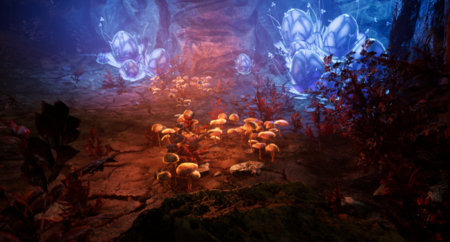
We want our players to have a reason to explore the wilderness, to travel with purpose, and much of that will be driven by our resource system. Transporting these goods might just be more difficult than gathering them. Our regional market system allows players to participate in creating pocket economies that will reinforce the stability of goods in particular regions.[26]
Gatherable resources (also known as raw materials, gatherables, and harvestables) occur in locations where you would expect them to be organically.[27][28]
- Lower level resources will be abundant. Higher level resources that are gatherable by Apprentice level or higher artisans will spawn randomly but in places that make sense for that type of resource. Surveying is a mechanic that solo or group players can utilize to track these resources down.[27]
- We want to be able to spawn stuff randomly and we want to put it in places in the world that will make people travel and bolster up our local player-to-player economies: have people actually be out in the world looking for stuff and not standing in the same place waiting for a tree or a flower to respawn over and over again. So, we're having the best of the both Worlds where we have our lower tier stuff that will fill out the base look of our world, so that it's always looking good; and then the higher tier stuff, from apprentice onward, will always spawn randomly in places that we've deemed look good and make sense for what that thing is. So, surveying is a way that you can track that stuff down. It will help you find places, will help you find particular resources, will help you find resources at a certain rarity; and so it should be something you could do as a gatherer on your own, or group up with other people to bolster up the power of your survey, or the range or reach of it.[27] – Kory Rice
- Certain resources will only be gatherable for a limited time during specific story arcs.[29]
- You want to take advantage of the limited time you have during the story arcs to get some of these rare resources for crafting things.[29] – Jeremy Gess
- Some resources are only gatherable at specific times of the day or night.[34]
- The location the resource was found can affect the benefits, bonuses, and other characteristics of that resource.[35]
- Players drop resources and other items upon death, based on their applicable death penalties.[38][39][40][41]
- Resources looted from caravan wreckages become stolen resources.[42][43]
- Resources do not expire or degrade over time.[44]
- We don't want to create an environment I feel where you're having to micromanage each of the resources that are very vast in our game. We have 100 plus material system where you're having to play whack-a-mole with managing those things... I don't see the value in it.[44] – Steven Sharif
- Raw materials (gatherable resources) are not to be confused with crafting materials (processed goods).[1][45]
Resource quality
Recursos will have differing tiers of quality for the same resource type.[37] This is somewhat similar to Star Wars Galaxies.[47]
- Gatherers who are more advanced in their artisan tree will unlock higher level harvesting tools that have a greater chance of collecting higher quality resources or proccing a greater quantity.[37][48][49]
- You will have an opportunity to proc certain qualities based on your progression in the Artisan tree. So if you are a gatherer; and as you advance in your gathering, you'll have a higher opportunity to collect better resources.[49] – Steven Sharif
Processed goods (crafting materials)
Crafting materials (also known as Processed goods) are obtained in the following ways:
The rarity of crafting materials influences the quality of the crafted items.[52][53][54][55]
- Q: Are crafting materials going cross tiers? For example, using higher level materials in lower level recipes, or low level materials in a higher level recipe? Is that allowed?
- A: Yes.[52] – Steven Sharif
It's unlikely that crafting materials to craft all pieces of equipment will be able to be sourced solely by farming open-world dungeons.[56]
- It's unlikely that organized parties will be able to get all of the materials they need to craft every piece of equipment from farming open world dungeons alone.[56] – Cody Peterson
Players drop materials and other items upon death, based on their applicable death penalties.[38][39][40][41]
List of processed goods
High-level materials
Materials for crafting high-level items are obtained from world bosses and through the deconstruction of other high-level items.[50]
Many end level items with crafting will require mats from world bosses etc. we want those systems intertwined. However. There may be opportunities to deconstruct high level items and replace those needed materials as well. We will be testing the crafting trees in alpha and beta.[50] – Steven Sharif
Artisan progression
| Artisan level | Artisan certification | Profession limit per character |
|---|---|---|
| 1-10.[59][60] | Novice.[57][61] | 22.[57][58] |
| 10-20.[62][60] | Apprentice.[57] | 5.[57][58] |
| 20-30.[62] | Journeyman.[57][3] | 4.[57][58] |
| 30-40.[62] | Master.[57][3] | 3.[57][58] |
| 40-50.[62][63] | Grandmaster.[57][3] | 2.[57][64][58] |
Artisan progression occurs based on experience (repetition of tasks) as well as achievements of certain benchmarks within each artisan branch (Coleta, Processamento and Fabricação).[66] Progression in each artisan profession is per-character.[67][68][69][70]
- All 22 professions, the players get to be novice of; and then it starts narrowing from there. So, after that you'll only be able to be apprentice of five things. You can be a journeyman in four things. You can be a master in three things; and you can be a grandmaster in two things. So you'll need to narrow, but you can also diversify to support the professions that you want to first push further in.[58] – Kory Rice
- Progression to each "tier" within a profession grants skill points that can be utilized in a character's artisan skill tree.[72]
- Artisan certification quests must be completed to gain proficiency in that tier of artisan progression.[73] Completing certification unlocks benefits for that profession, such as artisan tools for gathering professions and recipes for crafting professions.[74][75]
- There are limits to the number of professions at each certification tier across the three artisan branches.[57][64][76][58][77] For example: a character may only ever be a Master in up to 3 professions and Grandmaster in up to 2 professions across all artisan branches.[57][64]
- Grandmaster artisans can max out their entire profession skill tree, but a character can only be a grandmaster of up to two professions.[78]
- Achieving an artisan certification in a profession also implies that the character also achieved any lower-tier certifications up to that point.[79]
- If you are grand master in that profession you can max out the entire tree. But you can only grand master 2 things.[78] – Kory Rice
- Choosing a specific path in the skill tree allows the player an opportunity to specialize in a certain area. This encourages player inter-dependency, enhancing the artisan experience.[80]
- Progression within artisan classes does not directly relate to progression in a character's adventuring class, but there are requirements that take into account dangers, locations, toolsets, and surveying options that are dependent on adventuring level.[81][82][83]
- Characters gain XP as they progress their professions.[84][75]
- It should be expected that some artisans will have significantly higher artisan level than their adventuring level.[84][81]
- Q: In regards to character level and artisan level. We know that currently there are two separate things. That being said, what prevents a player from staying level one and partying up with a level 50 player to then gather level 50 resources in the high zones? That way, anyone who wants to take those resources will have to kill the gatherer who is level one and get a large amount of corruption for killing a level one as a level 50.
- A: Gathering higher level resources requires significant advancement within a particular profession for that gatherable resource. So, if I'm a Miner and I want to access the highest possible mineral, I need to be a master miner; and in order to achieve the master minor status I am going to be gaining adventuring level experience through that process, because many of those quest lines, many of those achievements are facilitated through quest lines. Some of those quest lines interface with adventuring difficulties that are out in the wild at certain levels. So that's going to predicate me- that's going to be a predicate for me to achieve a certain level in order to complete some of these quest lines and achieve that master status. So you will you will likely not see the ability of a level one alt character having the access to high level mineral mining, or any other type of gatherable out there.[81] – Steven Sharif
Artisan mastery
A character may only ever be a Master in up to 3 professions and Grandmaster in up to 2 professions across all artisan branches.[57][64]
- Artisan mastery is no longer restricted to a single branch.[64]
- Characters may change which professions they master.[85]
- Becoming a master Crafter or a master Processor or a master Gatherer should be a significant time investment and resource investment; and because of that it should also be something that when you achieve that status it's like people on the server know who you are.[86] – Steven Sharif
- Masteries aren’t just about making an item. They grant many things, including titles, access to items, bargains, and quests. [87]
- Previously it was stated that with considerable effort a player can master all professions within a mastered parent artisan class.[88][89] This was later changed to a player being able to master some but not all professions within a mastered parent artisan class.[90][91] This was changed to being able to master up to two or three professions within a mastered parent artisan class (subject to testing).[68] This was changed to being able to master up to two professions.[67] The current stance is only being able to become a Master of 3 professions and Grandmaster of 2 professions across all branches.[57][64]
- Q: What would be the daily activities for someone at level 50 with a maxed out artisan tree?
- A: The daily activity might be something along the lines of, depending on what type of profession or processor you are, of interacting with fellow artisanship individuals to wheel and deal on supply and demand chains; orchestrating and participating and caravan roads that move materials across the world so that you can satisfy buy orders and/or commission requests. Participating in unique trades and/or dungeon experiences that have the opportunity to acquire unique crafting materials so that you can create the dragon's legendary sword and sell that potentially. Finding unique harvestable materials in remote parts of the world or engaging in treasure map finding for again unique materials and/or processing things. There's a whole host of different intents that are loops for the players to participate in that again are situationally relevant based on the world state.[92] – Steven Sharif
Artisan gear
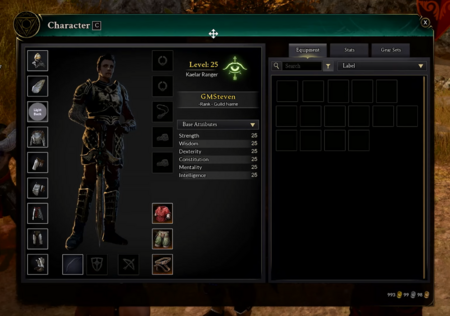
There's gear for all of the different crafting, gathering, and processing professions that'll help you do those different trades.[94] – Kory Rice
Artisan gear boosts artisans in their gathering, processing, or crafting professions.[94][95][96]
- Profession NPCs sell lower level artisan gear.[97] Higher level gear is crafted by players.[95]
- There are three artisan gear slots on a character's paper doll UI.[93] Previously these was referred to as undergarment slots.[95]
- Artisan gear and adventuring gear do not need to be swapped for either to be effective when they are equipped on a character, but players will be able to toggle gear visibility between their adventuring and artisan gear.[98][93][95]
- If you want to be seen as wearing the herbalists outfit, you're still going to have your adventuring gear present and on the character, and benefiting from the stats that are conferred by them; and vice-versa.[98] – Steven Sharif
- Gathering tools and artisan gear have stats that affect gathering rates and yields.[99][100]
- Gear for artisans are going to live alongside your adventuring gear. So you will currently- the approaches, and we'll test this but currently- the approach is you'll have artisanship oriented gear. This might be beneficial for your gathering; it might be beneficial for your processing, or crafting, or whatever it is- your profession. Essentially you will craft that gear, you will equip that gear, it'll live almost as a undergarment slot so to speak; and then you can activate that and it will show the appearance if you wish during the activation when you gain the benefit from the from the gear itself; and then could disappear afterwards and go back to your adventuring gear. That's the current approach. We're going to play with that a little bit. There's some discussion and disagreement on the team about how we do that, but our hopes are for Alpha two, we will have I think a couple of sets at least. We're demonstrating all of the artisanship from gathering to processing to crafting in limited fashion in Alpha 2 want to have that gear present to play with this approach.[95] – Steven Sharif
Artisan supply chain
Artisans within Ashes of Creation must choose a path in their artisan skill tree. This inter-dependency establishes a supply chain from raw materials to finished product.[101][45] Each stage of the chain may require caravans to transport goods from one artisan to another.[80]
- Obtaining raw materials:[102]
- Refining the raw materials with the Processamento profession.[45]
- Fabricação the finished product using its crafting recipe.[45]
As a crafter you're going to want to know where certain recipes can be fulfilled; which nodes have the capability of creating what you've processed material that you've gathered for; and then you're going to want to plan out your route to either transit the goods there or make sure that you're situated in the area so that you can go out collect and build in that area as well. So there's a lot of planning that's going to be necessary.[105] – Steven Sharif
Coleta
Coleta é uma das classes artesãs no Ashes of Creation.[25][108]
- Recursos coletáveis são descobertos por tentativa e erro, e aprendendo seus visuais.[25]
- A coleta requer a criação e o uso de ferramentas.[2][109]
- Coletar recursos dentro da Zona de influência (ZI) de uma base contribuirá ao crescimento da experiência desta base.[25]
- Certos coletáveis de nível baixo terão uma progressão nivelada à fabricação de nível mais alto.[110]
Certos coletáveis de nível baixo vão ter uma progressão nivelada até a fabricação de nível mais alto. Então por exemplo, se eu estiver coletando... folhas da flor da pétala azul para fabricar um pigmento que vai ser usado no desenvolvimento de uma túnica que eu posso vestir no nível um, aí talvez eu precise coletar elas para poder fabricar os pigmentos para fabricar um pigmento maior que pode estar presente na fabricação de um item de nível mais alto. Então vai ser tipo uma progressão nivelada para que os materiais tenham relevância ao longo dos níveis diferentes de fabricação; e isso é importante de um ponto de vista de estabilidade econômica. Você precisa ter uma procura em camadas de um ponto de vista de oferta para que jogadores que tenham interesse em colecionar e coletar esses materiais sejam relevantes quando os itens de níveis mais altos são fabricados.[110] – Steven Sharif
Fabricação
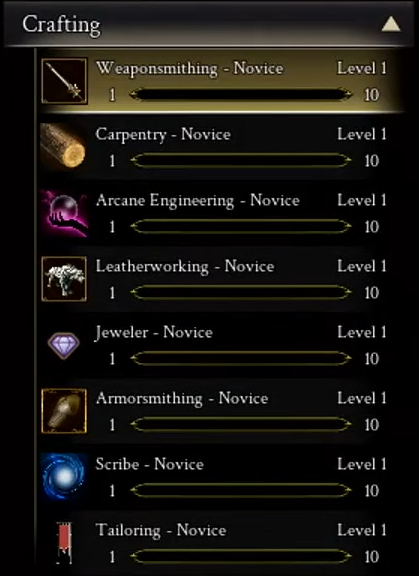
Crafting and gathering is a very important component of the economy that players will have direct control over. Whether you wish to build a sprawling plantation around your house, or wish to travel the vast wilderness in search of treasure and resources. There are many tools available to the crafters of our world. Regardless of how you gather your resources, we believe that every item that exists in the world should in some way reflect its creator. As such, there will be extreme versatility in our crafting system – giving crafters the ability to create unique items that represent their strengths and weaknesses.[26]
Fabricação is one of the artisan classes in Ashes of Creation. It is a driving force for the game economy.[26][111]
- Crafting in Ashes of Creation is recipe-based not RNG based.[52][112][2][113][114]
- Crafting stations are located on freeholds or within nodes.[115][116]
- Higher tier crafting stations are unlocked with node progression.[117]
- Players can only craft up to journeyman level on freeholds.[3]
- Top tier crafting stations are present at all node types, however Academic nodes offer additional bonuses to crafting performed there.[118]
- Artisan gear will enable crafting of stronger items.[95][96]
- Crafting times may vary between professions but the bulk of the time spent in the artisan system resides in the processing branch.[10]
- Not every crafting profession is able to craft consumables.[119]
- The developers are seeking feedback on the addition of a gameplay layer to crafting that determines the outcome based on the player's performance.[120][121]
- The developers are debating whether this occurs on a craft-by-craft basis or a one-off basis following after a new level of certification has been achieved.[120]
- This will be revealed when it is ready to be showcased.[120]
- There will not be a labor or energy system in Ashes of Creation.[122]
- There is no labor or energy system in Ashes. However, that's not to say that crafting will not be difficult. Crafting is very difficult; but it is because it is difficult that it will be very rewarding as well.[122] – Steven Sharif
Timeline
Classes Artesãs estão programadas para lançar no Alpha-1.[123]
Visuais
2023-12-04 2023-12-03
Community guides
Ver também
Referências
- ↑ 1.0 1.1 1.2 1.3 1.4 1.5 Transmissão ao vivo, 2017-05-05 (34:15).
- ↑ 2.0 2.1 2.2 Entrevista, 2020-03-27 (9:00).
- ↑ 3.00 3.01 3.02 3.03 3.04 3.05 3.06 3.07 3.08 3.09 3.10 3.11 3.12 Development Update with Freehold Preview.
- ↑ 4.0 4.1 Transmissão ao vivo, 2023-04-07 (31:49).
- ↑ 5.0 5.1 Vídeo, 2023-11-30 (46:59).
- ↑ 6.0 6.1 6.2 6.3 Vídeo, 2023-11-30 (48:22).
- ↑ 7.0 7.1 Blog: Exploring the Boundless Opportunities of Freeholds.
- ↑ 8.0 8.1

- ↑ Transmissão ao vivo, 2022-06-30 (1:08:02).
- ↑ 10.0 10.1 10.2 10.3 Podcast, 2021-04-11 (40:20).
- ↑ Vídeo, 2023-06-30 (15:34).
- ↑ Entrevista, 2023-07-09 (33:55).
- ↑ Transmissão ao vivo, 2023-06-30 (33:26).
- ↑ Transmissão ao vivo, 2023-06-30 (37:30).
- ↑ 15.0 15.1 15.2 15.3 Vídeo, 2023-06-30 (16:02).
- ↑ 16.0 16.1 16.2 16.3 Transmissão ao vivo, 2023-06-30 (38:18).
- ↑ 17.0 17.1 17.2 17.3 17.4 Transmissão ao vivo, 2022-02-25 (1:12:27).
- ↑ 18.0 18.1 18.2 18.3 18.4 18.5 Transmissão ao vivo, 2023-11-30 (1:26:16).
- ↑ 19.0 19.1 19.2 19.3 19.4 Vídeo, 2023-11-30 (39:15).
- ↑ Transmissão ao vivo, 2023-11-30 (1:28:10).
- ↑ 21.0 21.1 Vídeo, 2023-11-30 (43:43).
- ↑ 22.0 22.1 Entrevista, 2023-07-09 (54:46).
- ↑ 23.0 23.1 Vídeo, 2023-11-30 (45:47).
- ↑ 24.0 24.1 Vídeo, 2023-11-30 (45:02).
- ↑ 25.0 25.1 25.2 25.3 Transmissão ao vivo, 2017-09-03 (10:48).
- ↑ 26.0 26.1 26.2 About Ashes of Creation.
- ↑ 27.0 27.1 27.2 Vídeo, 2023-11-30 (28:22).
- ↑ 28.0 28.1 Transmissão ao vivo, 2017-05-08 (54:26).
- ↑ 29.0 29.1 Vídeo, 2023-03-31 (16:42).
- ↑ Transmissão ao vivo, 2022-05-27 (55:47).
- ↑ Vídeo, 2022-05-27 (15:50).
- ↑ Transmissão ao vivo, 2017-05-08 (20:27).
- ↑
- ↑ Vídeo, 2023-11-30 (34:36).
- ↑ Transmissão ao vivo, 2023-04-28 (1:24:36).
- ↑ Transmissão ao vivo, 2020-07-31 (1:05:58).
- ↑ 37.0 37.1 37.2 Transmissão ao vivo, 2020-07-25 (1:04:50).
- ↑ 38.0 38.1 Transmissão ao vivo, 2021-03-26 (1:07:33).
- ↑ 39.0 39.1

- ↑ 40.0 40.1 Podcast, 2017-05-05 (43:05).
- ↑ 41.0 41.1 Entrevista, 2020-07-18 (27:11).
- ↑ Transmissão ao vivo, 2023-10-31 (1:18:33).
- ↑

- ↑ 44.0 44.1 Transmissão ao vivo, 2023-03-31 (1:19:26).
- ↑ 45.0 45.1 45.2 45.3 45.4 45.5 Transmissão ao vivo, 2017-05-10 (8:22).
- ↑ Vídeo, 2023-11-30 (30:19).
- ↑
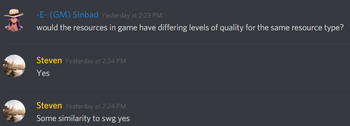
- ↑ Transmissão ao vivo, 2020-04-30 (53:11).
- ↑ 49.0 49.1 Entrevista, 2018-10-20 (2:13).
- ↑ 50.0 50.1 50.2 50.3

- ↑ Transmissão ao vivo, 2021-07-30 (1:16:05).
- ↑ 52.0 52.1 52.2 Transmissão ao vivo, 2023-11-30 (1:58:55).
- ↑ Transmissão ao vivo, 2023-11-30 (1:38:47).
- ↑ Vídeo, 2023-11-30 (59:21).
- ↑ Entrevista, 2018-10-20 (17:31).
- ↑ 56.0 56.1 Forums - Livestream Q&A 2022-08-26.
- ↑ 57.00 57.01 57.02 57.03 57.04 57.05 57.06 57.07 57.08 57.09 57.10 57.11 57.12 57.13 57.14 57.15

- ↑ 58.0 58.1 58.2 58.3 58.4 58.5 58.6 58.7 58.8 58.9 Vídeo, 2023-11-30 (37:12).
- ↑

- ↑ 60.0 60.1 Vídeo, 2023-11-30 (9:36).
- ↑ 61.0 61.1 Transmissão ao vivo, 2023-06-30 (50:07).
- ↑ 62.0 62.1 62.2 62.3 Podcast, 2023-12-03 (14:14).
- ↑ Podcast, 2023-12-03 (2:53).
- ↑ 64.0 64.1 64.2 64.3 64.4 64.5
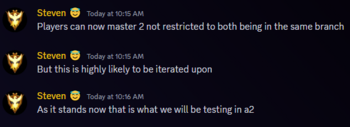
- ↑ Vídeo, 2023-11-30 (23:20).
- ↑ Entrevista, 2021-02-07 (36:38).
- ↑ 67.0 67.1

- ↑ 68.0 68.1 Transmissão ao vivo, 2022-04-29 (1:13:00).
- ↑ Transmissão ao vivo, 2019-07-26 (1:09:46).
- ↑ Transmissão ao vivo, 2017-05-24 (32:07).
- ↑ Podcast, 2023-12-03 (10:22).
- ↑ Vídeo, 2023-11-30 (26:38).
- ↑ Vídeo, 2023-11-30 (16:40).
- ↑ Podcast, 2023-12-03 (17:10).
- ↑ 75.0 75.1 Vídeo, 2023-11-30 (36:00).
- ↑
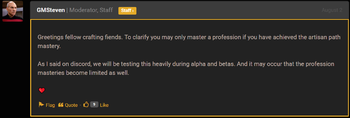
- ↑

- ↑ 78.0 78.1 Podcast, 2023-12-03 (6:23).
- ↑

- ↑ 80.0 80.1 Transmissão ao vivo, 2017-05-10 (6:12).
- ↑ 81.0 81.1 81.2 Transmissão ao vivo, 2023-04-07 (1:00:55).
- ↑ Transmissão ao vivo, 2022-10-28 (1:32:38).
- ↑ Transmissão ao vivo, 2020-07-31 (1:31:11).
- ↑ 84.0 84.1 Podcast, 2023-12-03 (15:05).
- ↑

- ↑ Entrevista, 2020-07-20 (18:47).
- ↑

- ↑

- ↑
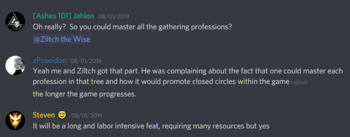
- ↑

- ↑

- ↑ Entrevista, 2023-07-09 (42:51).
- ↑ 93.0 93.1 93.2 Vídeo, 2023-11-30 (19:06).
- ↑ 94.0 94.1 Vídeo, 2023-11-30 (5:47).
- ↑ 95.0 95.1 95.2 95.3 95.4 95.5 95.6 Transmissão ao vivo, 2022-06-30 (1:17:34).
- ↑ 96.0 96.1 Transmissão ao vivo, 2021-03-26 (1:06:50).
- ↑ Vídeo, 2023-11-30 (12:05).
- ↑ 98.0 98.1 Transmissão ao vivo, 2023-11-30 (1:37:49).
- ↑ Vídeo, 2023-06-30 (3:14).
- ↑ Vídeo, 2022-10-28 (26:14).
- ↑ Entrevista, 2020-07-20 (20:17).
- ↑ 102.0 102.1 102.2 102.3 102.4 Transmissão ao vivo, 2017-05-08 (20:41).
- ↑ Transmissão ao vivo, 2017-07-18 (38:30).
- ↑ Transmissão ao vivo, 2017-05-26 (26:00).
- ↑ Entrevista, 2018-05-11 (24:18).
- ↑
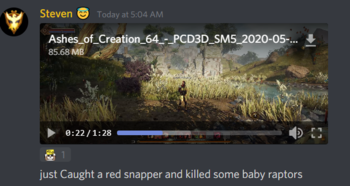
- ↑ Transmissão ao vivo, 2020-03-28 (48:31).
- ↑

- ↑ Entrevista, 2018-05-11 (38:25).
- ↑ 110.0 110.1 Podcast, 2018-05-11 (1:00:07).
- ↑
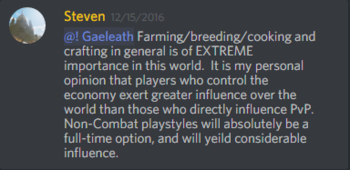
- ↑ Vídeo, 2023-11-30 (3:49).
- ↑ Transmissão ao vivo, 2017-05-05 (20:41).
- ↑

- ↑ Transmissão ao vivo, 2020-01-30 (1:38:26).
- ↑ Transmissão ao vivo, 2017-05-12 (1:00:18).
- ↑ Entrevista, 2020-07-19 (6:38).
- ↑ Transmissão ao vivo, 2023-12-19 (1:50:51).
- ↑ Transmissão ao vivo, 2023-11-30 (2:00:22).
- ↑ 120.0 120.1 120.2 Transmissão ao vivo, 2023-11-30 (1:40:11).
- ↑ Transmissão ao vivo, 2022-10-14 (35:22).
- ↑ 122.0 122.1 Entrevista, 2018-10-20 (2:31:39).
- ↑ Podcast, 2018-05-11 (59:25).
